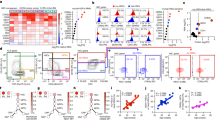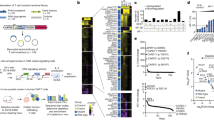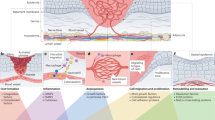Abstract
Human myeloid DC were generated from peripheral blood mononuclear cells by monocyte adhesion and subsequent culture with rhGM-CSF and rhIL-4. We transduced immature (day 5 of culture) myeloid DC with an E1-deleted replication-deficient adenoviral vector encoding the cytokine IL-10 (AdV IL-10) and a control adenovirus MX-17 (AdV MX 17). Human DC transduced with AdV IL-10 showed inhibition of the mixed leukocyte culture, reduced cell surface expression of co-stimulatory molecules (CD80/CD86) and were unable to produce the potent allo-stimulatory cytokine, interleukin-12. In order to test the in vivo properties of these cells a humanized immunodeficient mouse skin transplantation model was developed. Immunodeficient NOD-scid mice were engrafted with human skin, reconstituted via intraperitoneal injection with allogeneic mononuclear cells (MNC) mixed with 1 × 106 DC that were autologous to the skin donor and that had been transduced with either AdV IL-10 or AdV MX-17. Skin grafts were removed at day 7 and 14 after reconstitution and studied histologically for evidence of rejection. In animals that received DC modified with AdV IL-10 there was reduced skin graft rejection as characterized by reduced mononuclear cell infiltration and less dermo–epidermal junction destruction compared with those animals that received DC modified with the control virus alone. Injection of equivalent numbers of donor-derived fibroblasts transduced with AdV IL-10 were ineffective at modifying rejection of skin grafts. Immunosuppressive cytokine gene therapy targeting human DC is a novel means of inhibition of the alloimmune response.
This is a preview of subscription content, access via your institution
Access options
Subscribe to this journal
Receive 12 print issues and online access
$259.00 per year
only $21.58 per issue
Buy this article
- Purchase on Springer Link
- Instant access to full article PDF
Prices may be subject to local taxes which are calculated during checkout








Similar content being viewed by others
References
Steinman R . The dendritic cell system and its role in immunogenicity Ann Rev Immunol 1991 9: 271–296
Hart D . Dendritic cells: unique leukocyte populations which control the primary immune response Blood 1997 90: 3245–3287
Banchereau J, Steinman R . Dendritic cells and the control of immunity Nature 1998 392: 245–251
Austyn J . Dendritic cells Curr Opin Hematol 1998 5: 3–15
Bottomley K . T cells and dendritic cells get intimate Science 1999 283: 1124–1125
Remuzzi G . Cellular basis of long term organ transplant acceptance: pivotal role of intrathymic clonal deletion and thymic dependence of bone marrow chimerism associated tolerance Am J Kid Dis 1998 31: 187–212
Larsen CP, Morris PJ, Austyn JM . Migration of dendritic leukocytes from cardiac allografts into host spleens J Exp Med 1990 171: 307–314
Austyn J, Larsen C . Migration pattern of dendritic leukocytes Transplantation 1990 49: 1–7
Mauri D, Pichler WJ . Involvement of CD80 in the generation of CD4+ cytotoxic T cells Immunol Res 1996 15: 126–140
Macatonia S et al. Dendritic cells produce IL-12 and direct the development of Th1 cells from naive CD4+ T cells J Immunol 1995 154: 5071–5079
Finkelman F et al. Dendritic cells can present antigen in vivo in a tolerogenic or immunogenic fashion J Immunol 1996 157: 1406–1414
Cella M, Sallusto F, Lanzavecchia A . Origin, maturation and antigen presenting function of dendritic cells Curr Opin Immunol 1997 9: 10–16
Nickerson P et al. Cytokines and the Th1/Th2 paradigm in transplantation Curr Opin Nephrol Hyper 1994 6: 757–764
Thomson AW, Lu L . Are dendritic cells the key to liver transplant tolerance? Immunol Today 1999 20: 27–32
Steptoe R, Thomson A . Dendritic cells and tolerance induction Clin Exp Immunol 1996 105: 397–402
Giannoukakis N, Thomson A, Robbins P . Gene therapy in transplantation Gene Therapy 1999 6: 1499–1511
Morel AS et al. Split activity of interleukin-10 on antigen capture and antigen presentation by human dendritic cells: definition of a maturative step Eur J Immunol 1997 27: 26–34
De Smedt T et al. Effect of interleukin-10 on dendritic cell maturation and function Eur J Immunol 1997 27: 1229–1235
Steinbrink K et al. Induction of tolerance by IL-10-treated dendritic cells J Immunol 1997 159: 4772–4780
Buelens C et al. Interleukin-10 prevents the generation of dendritic cells from human peripheral blood mononuclear cells cultured with interleukin-4 and granulocyte/macrophage-colony-stimulating factor Eur J Immunol 1997 27: 756–762
Starzl T et al. Cell migration, chimerism, and graft acceptance Lancet 1992 339: 1579–1582
Lu L et al. Transduction of dendritic cells with adenoviral vectors encoding CTLA4-Ig markedly reduces their allostimulatory ability Transplantation 1998 65: (Suppl.) 106–109
Zhong L et al. Recombinant adenovirus is an efficient and non-perturbing genetic vector for human dendritic cells Eur J Immunol 1999 29: 964–972
Aicher A et al. Successful retroviral mediated transduction of a reporter gene in human dendritic cells: feasibility of therapy with gene modified antigen presenting cells Exp Hematol 1997 25: 39–44
Gabrilovich D et al. Retrovirus-induced immunosuppression via blocking of dendritic cell migration and down-regulation of adhesion molecules Immunology 1994 82: 82–87
Thomson A, Lu L . Dendritic cells as regulators of immune reactivity: implications for transplantation Transplantation 1998 65: 1–8
Dietz A, Vuk-Pavlovic S . High efficiency adenovirus-mediated gene transfer to human dendritic cells Blood 1998 91: 392–398
Fu F et al. Costimulatory molecule-deficient dendritic cell progenitors (MHC class II+, CD80dim, CD86−) prolong cardiac allograft survival in nonimmunosuppressed recipients Transplantation 1996 62: 659–656
Lu L et al. Mouse bone marrow derived dendritic cell progenitors (NLDC 145+, MHC II+, B7.1dim, B7.2−) induce allo-antigen specific hyporesponsivenesss in murine T lymphocytes Transplantation 1995 60: 1539–1545
Lee W et al. Phenotype, function, in vivo migration and survival of allogeneic dendritic cell precursors genetically engineered to express TGFB Transplantation 1998 66: 1810–1817
Lu L et al. Adenoviral delivery of CTLA4Ig into myeloid dendritic cells promotes their in vitro tolerogenicity and survival in allogeneic recipients Gene Therapy 1999 6: 554–563
Takayama T et al. Retroviral delivery of viral interleukin 10 into myeloid dendritic cells markedly inhibits their allostimulatory activity and promotes the induction of T-cell hyporesponsiveness Transplantation 1998 66: 1567–1574
Min W-P et al. Dendritic cells genetically engineered to express Fas Ligand induce donor-specific hyporesponsivness and prolong allograft survival J Immunol 2000 164: 161–167
Qian S et al. Systemic administration of cellular interleukin-10 can exacerbate cardiac allograft rejection in mice Transplantation 1996 62: 1709–1714
Peguet Navarro J et al. Interleukin-10 inhibits the primary allogeneic T cell response to human epidermal Langerhans cells Eur J Immunol 1994 24: 884–891
Sultan P et al. Blockade of CD2-LFA-3 interactions protects human skin allografts in immunodeficient mouse/human chimeras Nat Biotechnol 1997 15: 759–762
Murray A et al. Human T cell mediated destruction of allogeneic dermal microvessels in a severe combined immunodeficient mouse Proc Natl Acad Sci USA 1994 91: 9146–9150
Briscoe D et al. The allogeneic response to cultured human skin equivalent in the hu-PBL-SCID mouse model of skin rejection Transplantation 1999 67: 1590–1599
Serreze D, Gaskins H, Leiter E . Defects in the differentiation and function of antigen presenting cells in NOD/Lt mice J Immunol 1993 150: 2534–2543
Shultz L et al. Multiple defects in innate and adaptive immunological function in NOD/LtSz-scid mice J Immunol 1995 154: 180–191
Steinbrink K et al. Interleukin-10 treated human dendritic cells induce a melanoma-antigen specific anergy in CD8+ T cells resulting in a failure to lyse tumour cells Blood 1999 93: 1634–1642
Coates T, Krishnan R, Russ G . Dendritic cells, tolerance and transplantation Nephrology 2000 5: 125–133
Romani N et al. Proliferating dendritic cell progenitors in human blood J Exp Med 1994 180: 83–93
Martin H, Nash A, Andrews A . Cloning and characterisation of an ovine innterleukin-10-encoding cDNA Gene 1995 159: 187–191
Kanegae Y, Makimura M, Saito I . A simple and efficient method for purification of infectious recombinant adenovirus Jpn J Med Sci Biol 1994 47: 157–166
Nyberg-Hoffman C et al. Sensitivity and reproducibility in adenovirus titer determination Nat Med 1997 3: 808–811
He T-C et al. A simplified system for generating recombinant adenoviruses Proc Natl Acad Sci USA 1998 95: 2509–2514
Chomczynski P, Sacchi N . Single step method of RNA isolation by acid guanidinium thiocyanate phenol chloroform extraction Anal Biochem 1987 162: 156–159
Fuga SAW, Fitzgerald SD, McGuire WL . A simple polymerase chain reaction method for detection method for detection and cloning of low abundance transcripts Biotechniques 1990 9: 206–211
Murray A et al. Dermal microvascular injury in the human peripheral blood lymphocyte reconstituted-severe combined immunodeficient (HuPBL-SCID) mouse/skin allograft model is T cell mediated and inhibited by a combination of cyclosporine and rapamycin Am J Pathol 1998 153: 627–638
Coates T et al. Dendritic cell based TH2 cytokine gene therapy in sheep Transplant Proc 2001 33: 180–181
Acknowledgements
We wish to thank the Australian Red Cross Blood Transfusion Service (Adelaide) for provision of buffy coats. Dr Coates is the recipient of an Australian Government National Health &Medical Research Council Post-Graduate Medical Research Scholarship. The laboratory is supported by grants from the Australian Kidney Foundation.
Author information
Authors and Affiliations
Rights and permissions
About this article
Cite this article
Coates, P., Krishnan, R., Kireta, S. et al. Human myeloid dendritic cells transduced with an adenoviral interleukin-10 gene construct inhibit human skin graft rejection in humanized NOD-scid chimeric mice. Gene Ther 8, 1224–1233 (2001). https://doi.org/10.1038/sj.gt.3301513
Received:
Accepted:
Published:
Issue Date:
DOI: https://doi.org/10.1038/sj.gt.3301513
Keywords
This article is cited by
-
Cell Mediators of Autoimmune Hepatitis and Their Therapeutic Implications
Digestive Diseases and Sciences (2015)
-
Uremia impairs monocyte and monocyte-derived dendritic cell function in hemodialysis patients
Kidney International (2007)
-
Dendritic cells genetically engineered to express IL-4 exhibit enhanced IL-12p70 production in response to CD40 ligation and accelerate organ allograft rejection
Gene Therapy (2003)
-
Gene Therapy Progress and Prospects: Gene therapy in organ transplantation
Gene Therapy (2003)



